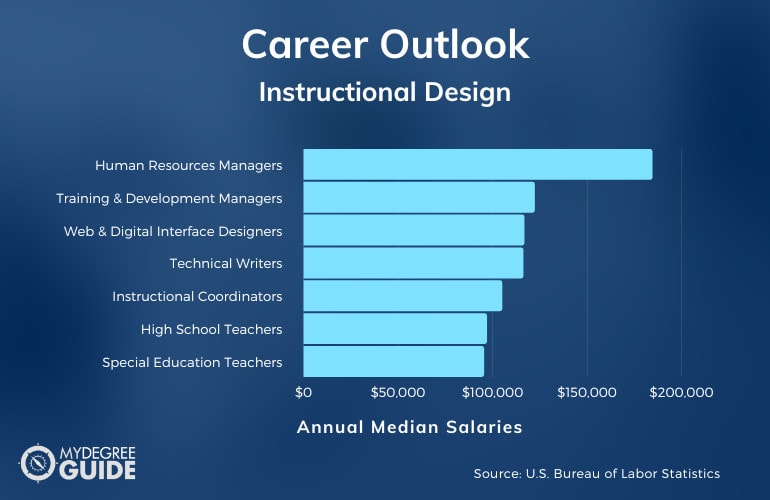A masters in instructional design can be beneficial for individuals who want to work in the education field. Instructional design typically involves creating learning materials for schools, businesses, or other organizations.

Although education is one of the most common paths for instructional design students, graduates may also pursue careers in other fields.
Editorial Listing ShortCode:
We’ve created this guide to help you get a better understanding of masters degree programs in instructional design. Read on to learn more about potential programs, curricula, and career paths.
Online Masters in Instructional Design Programs

An online masters in instructional design is a graduate-level degree program designed for individuals who want to create instructional plans for different entities.
If you’re interested in helping educate others by designing instructional materials, you might enjoy working as an instructional designer. You could also apply the skills you gain from an instructional design master degree to other careers.
Many students who pursue a degree in instructional design work in the field of education. Instructional designers can also be found in other industries that need training programs or instructional materials like manuals and presentations.
Here are some of the subjects you might study in an instructional design masters program:
- Concepts and principles of instructional design
- Instructional technology
- Education theories and methodologies
- Multimedia technology design
Earning your instructional design degree online could be helpful if you’re looking for a more flexible program that allows for distance learning.
Editorial Listing ShortCode:
Since instructional design involves the use of technology and different applications, enrolling in an online education degree program yourself could actually be beneficial in helping you learn through a more hands-on approach. This type of degree program is aimed to help students with a bachelor’s degree gain knowledge and skills to perform instructional designer tasks.
Common responsibilities of an instructional designer might include:
- Designing lesson plans to improve learning
- Creating instructional materials for employee training
- Collaborating with professionals to understand learning goals
- Following the latest learning technology innovations
If you pursue a Master of Education in Instructional Design, your focus will be more on applying techniques of instructional design in education settings. On the other hand, a Master of Science in Instructional Design concentrates on developing technical skills for instructional design purposes, which can be applied to many different fields.
Online masters in instructional design programs might offer different specializations in the field. For example, programs may include concentrations in learning strategy, curriculum design, media and technology, or electronic learning.
Instructional Design Careers & Salaries

A masters in instructional design can help you develop skill sets that are beneficial to several different career paths. Instructional design careers are often found in the education, business, or healthcare industries. Government positions can also be available in this field.
According to the Bureau of Labor Statistics, here are the median salaries of some of the career paths related to the field of instructional design.
| Careers | Annual Median Salaries |
| Human Resources Managers | $126,230 |
| Training and Development Managers | $120,130 |
| Web and Digital Interface Designers | $79,890 |
| Technical Writers | $78,060 |
| Instructional Coordinators | $63,740 |
| High School Teachers | $61,820 |
| Special Education Teachers | $61,820 |
| Training and Development Specialists | $61,570 |
| Kindergarten and Elementary School Teachers | $61,350 |
| Preschool and Childcare Center Directors | $47,310 |
Careers in the instructional design field primarily focus on designing and developing materials to produce positive learning outcomes. Knowledge and skills attained in an instructional design program can be applicable to a variety of roles.
Editorial Listing ShortCode:
A masters in instructional design and technology can help current or aspiring teachers gain more knowledge on lesson planning and development. Skills gained in an instructional design program can also be carried over into a business environment, such as in training development or human resources.
Instructional Design Master’s Curriculum & Courses

Curriculum for instructional design programs aim to teach you how to create instructional materials for different environments. Elective courses may be offered in certain instructional design programs that focus on a specific field.
The following are examples of core or elective courses that may be offered in instructional design masters online programs:
- Learning Theories and Instruction: You’ll examine different types of learning processes, styles, and student engagement to create effective instructional materials.
- Instructional Design: This course helps you gain foundational knowledge on instructional design principles, concepts, and practices.
- Foundations of Research: This course examines the various steps in the research process as well as how to analyze and evaluate data.
- Distance Learning: This course examines distance learning trends, theories, and technologies used to create impactful distance learning lessons.
- Project Management in Education and Training: This course helps you understand different systematic approaches to project management that are taken into consideration when designing instructional materials.
- Multimedia Design and Development: You’ll explore different types of multimedia used to develop instructional materials and carry out lessons.
- Instructional Design Production: This course is designed to teach you how to apply systematic processes of instructional design to create successful instructional materials and plans.
- Foundations of Instructional Technology: This course examines the instructional technology field and provides an overview of common instructional technology practices and media used.
- Cognition and Instructional Design: You’ll explore instructional psychology, cognitive science, and learning theories to be applied to instructional design systems.
- Consulting for Instructional Designers: This course helps you gain knowledge and skills to collaborate with peers and consult with clients in the industry.
In an instructional design program, you can learn how to design instructional materials, navigate instructional technologies, and consult with individuals and organizations to improve learning outcomes.
How to Become an Instructional Designer

There isn’t one set pathway for becoming an instructional designer. Many professionals in the field come from varying educational backgrounds. So, you might have several options available for starting your career in instructional design.
One of the most direct pathways to becoming an instructional designer is earning a degree in instructional design or education. Common criteria to become an instructional designer often include:
- Bachelor’s or master’s degree. Some instructional designer positions may accept a bachelor’s degree, while others require a master’s or higher.
- Core coursework in instructional design. If you plan on furthering your education after receiving a bachelor’s, you can start to think about what kind of graduate degree in instructional design best aligns with your goals. Some programs offer specializations that might be more suitable to your interests.
- Portfolio to showcase work to future employers. Creating a portfolio of your instructional design work allows employers to see your skills. This could be especially beneficial if you don’t have much experience in the field yet.
It can also be helpful to build up your soft skills to prepare you for a career in instructional design. These soft skills are often useful in the instructional design field:
- Effective communication
- Time management
- Organization
- Critical thinking
- Problem-solving
Courses in instructional design master’s programs often help you develop these essential skills.
Admissions Requirements

Admission requirements can vary depending on the program or school you plan on attending. The following are general admission requirements for many master’s degree programs:
- Minimum GPA
- Official undergraduate or graduate transcripts
- Resume or curriculum vitae
- Personal statement
Official transcripts are typically requested to verify previous coursework you have completed. A personal statement might also be included in the application process, giving you the opportunity to showcase your current skills and talk about your goals for the future.
Some programs are designed for students with a bachelors in instructional design, but many accept applicants with any undergraduate degree.
Instructional Design Graduate Programs Accreditation

It’s beneficial to consider the accreditation status of a program or school when exploring your options. Regional accreditation means that a school meets top education quality standards.
Not only does an accredited program give your education credibility, but it can also factor into future education opportunities. If you intend on pursuing a doctoral degree, admission requirements may include an accredited graduate degree.
Editorial Listing ShortCode:
Industry certifications that might be available may also be designed for individuals who completed a master’s degree through an accredited school or program. In addition, employers often take accreditation into consideration when reviewing educational qualifications as well.
Financial Aid and Scholarships

Schools may offer special grant or scholarship opportunities exclusively for its students. Some scholarships may be available for specific programs and offer students a stipend or tuition assistance.
In addition, you can apply for federal financial aid through the US Department of Education by filling out the Free Application for Federal Student Aid (FAFSA). State financial aid may also be available to eligible students. If you’re currently employed, you can check with your employer to see if they offer tuition assistance for further career and education development.
Public and private organizations generally offer scholarship opportunities for students as well. Those who are considered eligible may be selected to receive partial or full tuition assistance, depending on the scholarship program.
What Is an MS in Instructional Design and Technology?
A Master of Science in Instructional Design and Technology (MSIDT) is a graduate-level degree program designed for those who are interested in creating instructional plans and materials.
An MSIDT focuses more on the technological aspects of instructional design. You may study different learning management systems and technological innovations beneficial to instruction. This type of program may interest students who want to learn more about applying design concepts to various technologies used to facilitate learning.
Graduates of this degree often pursue careers in education or business. They might take on roles like project management and development or teaching.
Is Instructional Design a Good Career?

Yes, instructional design is a good career for many professionals. As technology becomes an increasingly important tool for many fields, the need for instructional design careers will likely continue to grow.
The Bureau of Labor Statistics projects 10% job growth for education and training occupations over the next ten years. Growth is also anticipated due to the demands of training in the field of education. A masters in instructional design can be supplemental for many undergraduate degrees. It can also help you prepare for work in education or business, depending on your interests and degree track.
What Can You Do with a Master’s Degree in Instructional Design?
Professionals with a masters in instructional design may pursue several types of careers in different industries. Many instructional design students pursue careers in education. Other possible industries that align with instructional design skills include government agencies, corporations, nonprofits, or healthcare.
Many instructional coordinators work for schools or for local and state governments. They may design or evaluate curricula for classrooms. Training and development specialists tend to work for corporations. Their responsibilities could include designing training courses for employees.
Instructional designers can also work with government entities or other organizations to produce materials for activities and events.
How Long Does It Take to Get a Master’s in Instructional Design and Technology Online?
Most masters programs take 1 to 2 years to complete with full-time enrollment. Instructional design masters programs can vary in credit hours, which can impact how long it takes to earn your degree. For instance, if a program is 36 credit hours, it may take as little as 1 year to finish if you study full-time, including during the summer.
Editorial Listing ShortCode:
Some masters programs may include a thesis component. If a thesis is included, your program may take additional time to complete. Part-time enrollment can also add on additional time for completion. The amount of coursework you have can also be impacted by a chosen degree specialization.
What’s the Difference Between an MS vs. MEd in Instructional Design Program?
Students pursuing a graduate degree in instructional design may choose between a Master of Science or a Master of Education in Instructional Design.
Here are some key differences between these two degrees.
| MS in Instructional Design | MEd in Instructional Design |
|
|
Students interested in the technical aspect of instructional design may prefer a Master of Science (MS) program. Professionals with a special interest in education theory may choose to pursue a Master of Education (MEd) instead.
Is a Masters in Instructional Design Online Degree Worth It?

Yes, a masters in instructional design online degree is worth it for many students. If you enjoy helping others learn and grow, you might find a career in instructional design rewarding.
Editorial Listing ShortCode:
Whether you’ve just completed a bachelor’s degree or have a background in education, an instructional design masters program could help you advance your qualifications in the field. The Bureau of Labor Statistics estimates that instructional coordinators will see 10% job growth over the next decade. Similarly, employment for training and development specialists and managers is expected to grow 11%.
Universities Offering Online Masters in Instructional Design and Technology Degree Program
Methodology: The following school list is in alphabetical order. To be included, a college or university must be regionally accredited and offer degree programs online or in a hybrid format.

Anderson University offers a Master of Science in Instructional Design and Learning Technology. The degree can be completed online, potentially in just 1 year. The curriculum focuses on how to make the best possible use of technology in educational settings. Students in the program receive an iPad and Apple Pencil.
Anderson University is accredited by the Commission on Colleges of the Southern Association of Colleges and Schools.

Arizona State University offers an online program for a Master of Education in Learning Design and Technologies. The program consists of 30 credit hours in the form of ten classes that are each 7.5 weeks long. Courses include Introduction to Research and Evaluation in Education, Modalities of Learning, Evaluation of Learning Systems, and more.
Arizona State University is accredited by the Higher Learning Commission.

Bellevue University offers a Master of Science in Instructional Design and Technology. The degree is 100% online and includes the opportunity to build a portfolio. Students progress through the program one class at a time with a cohort. The admissions process is designed to be simple and does not require GRE or GMAT scores.
Bellevue University is accredited by the Higher Learning Commission.

Emporia State University offers a Master of Science in Instructional Design and Technology. The degree is available completely online. The curriculum covers how to design instructional materials systematically and consider the needs of different learners. Graduates work in a variety of educational and technology-oriented settings.
Emporia State University is accredited by the Higher Learning Commission.

Fontbonne University offers a program for a Master of Science in Instructional Design and Technology. It offers four specialties: Learning Technologies, Learner Experience Design, Web Development and Multimedia Production, or Mobile App Development and Computer Programming. All required core courses are available online, as are some specialty area courses.
Fontbonne University is accredited by the Higher Learning Commission.

Liberty University offers a Master of Education in Instructional Design and Technology that can be earned online. The program consists of 30 credit hours of 8 week courses. It can usually be completed within 1 year. Courses include Technology Practices for Instructional Improvement, Foundations of Educational Technology and Online Learning, and more.
Liberty University is accredited by the Southern Association of Colleges and Schools Commission on Colleges.

Purdue University’s online Master of Science in Instructional Design and Technology program can typically be completed in about a year and a half of full-time study. Each class is 6 weeks long. Students usually commit about 20 hours per week to their studies. The program’s faculty members have professional experience working in the field.
Purdue University is accredited by the Higher Learning Commission of the North Central Association of Colleges and Schools.

Saint Mary’s University of Minnesota offers an online program for a Master of Education in Learning Design and Technology. The program requires the completion of 30 credit hours, which can usually be finished in 20 months. The curriculum emphasizes project-based learning and the application of technology rather than writing papers. All classes are available 100% online.
The Saint Mary’s University of Minnesota is accredited by the Higher Learning Commission.

Seton Hall University offers a Master of Arts in Instructional Design and Technology that can be earned online. There are tracks available for certified teachers and non-certified candidates. The program consists of 36 credits of courses such as Digital Research and Information Literacy, Emerging Web Technologies, and Online Course Management and Delivery.
Seton Hall University is accredited by the Middle States Commission on Higher Education.

St. Thomas University’s Master of Science in Instructional Design and Technology is available 100% online. The curriculum is kept up to date with rapid changes in technology. To graduate, students must complete 30 credit hours of coursework, which can usually be finished in 10 months. Courses include Technology Integration, Multimedia Design and Development, Applied Research Methods, and more.
St. Thomas University is accredited by the Southern Association of Colleges and Schools Commission on Colleges.

Texas A&M University offers an online M.Ed. in Learning Design and Technology. Core course options include Educational Psychology, E-Learning Design and Development, Learning Theories, and more. Students are also required to complete 15 credit hours of electives. The program offers start dates in the spring and fall.
Texas A&M University is accredited by the Southern Association of Colleges and Schools Commission on Colleges.

The University of Arizona offers an online program for a Master of Science in Instructional Design and Technology. Students take one course at a time in accelerated, 6 week sessions. Course possibilities include Instructional Analysis I and II, Project Management, Evaluation of Instructional Systems, and more. The program culminates with the completion of a final project.
The University of Arizona is accredited by the Higher Learning Commission.

The University of Central Florida offers an online program for an MA in Instructional Design and Technology. Students can customize the curriculum by choosing from different tracks, including Educational Technology, Instructional Systems, and E-Learning. The program requires the completion of 36 credit hours of coursework and is intended for working professionals.
In addition to a master’s degree, UCF offers an online graduate certificate in instructional design.
The University of Central Florida is accredited by the Southern Association of Colleges and Schools Commission on Colleges.

The University of Cincinnati offers a Master of Education in Instructional Design and Technology. The degree is available 100% online, and classes are taught by experienced faculty members. The interdisciplinary curriculum provides many hands-on, experiential learning opportunities. Students can potentially finish in less than 2 years.
UC is accredited by the Higher Learning Commission.

The University of Massachusetts offers a Master of Education in Instructional Design. Students in the program have opportunities to study adult learning theory, technology, media, and more. The program is designed for those already employed in employee training and related fields. To graduate, students must complete twelve courses for a total of 36 credits.
The University of Massachusetts is accredited by the New England Commission of Higher Education.

The University of North Alabama offers a Master of Science in Instructional Technology and Design. The degree is relevant to those who provide instruction in school and business settings. Students in the program can choose from two tracks: Workplace Design and Performance Improvement or Instructional Design for Teaching, Learning and Leading.
The University of North Alabama is accredited by the Southern Association of Colleges and Schools Commission on Colleges.

The University of North Dakota offers an MS in Instructional Design and Technology. The degree is available on campus and online. Students in the program can choose between a scholarly project option that requires the completion of 34 credit hours or a thesis option that requires the completion of 36 credit hours.
UND is accredited by the Higher Learning Commission.

The University of West Florida offers an online program for a Master of Education in Instructional Design and Performance Technology. The program requires the completion of 36 credit hours and usually takes about 2 years to finish. Each class is 16 weeks long. The program is designed to be flexible to help students earn their degrees while maintaining busy schedules.
The University of West Florida is accredited by the Southern Association of Colleges and Schools Commission on Colleges.

Walden University’s MS in Instructional Design and Technology can be earned online. The program is customizable and designed for working professionals. To graduate, students must complete 30 semester credits. Course possibilities include Organizations, Innovation, and Change, Learning Theories and Instruction, Multimedia Design and Development I and II, and more.
Walden is accredited by the Higher Learning Commission.

West Virginia University’s MA in Instructional Design and Technology program uses an asynchronous, online format. Fall and spring classes are 15 weeks long, and summer sessions are 4 to 6 weeks long. The program requires the completion of 30 credit hours. Course possibilities include Introduction to Research, Instructional Design and Technology Theories and Models, Program Evaluation, and more.
West Virginia University is accredited by the Higher Learning Commission.
Getting Your Masters in Instructional Design Degree Online

A masters in instructional design online can be a beneficial program for professionals who want to design instructional materials that facilitate and improve learning.
This degree path can also be strategic for current or aspiring teachers who want to supplement their career in education. Instructional designers can also help organizations in other industries create instructional materials for things like onboarding and training.
If you’re ready to begin your journey toward a career in this field, you can start by exploring accredited online masters programs in instructional design that fit your interests.

